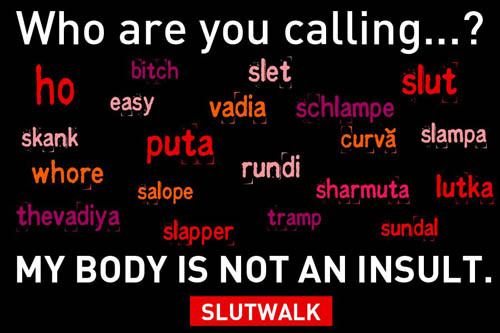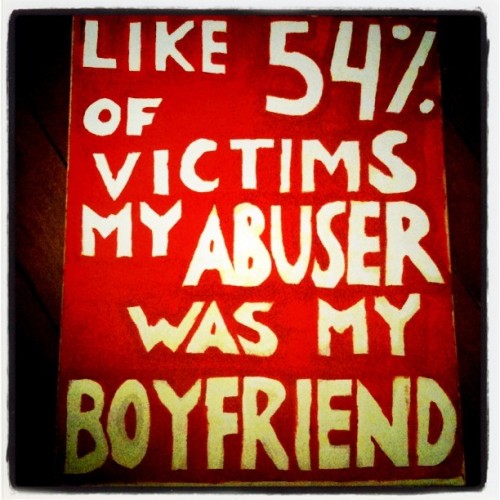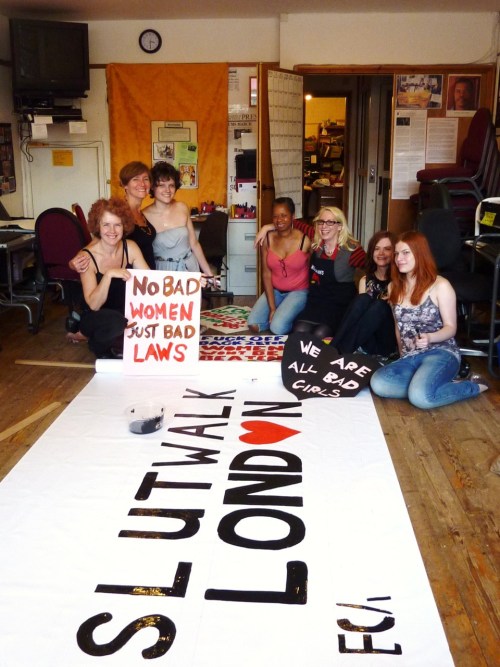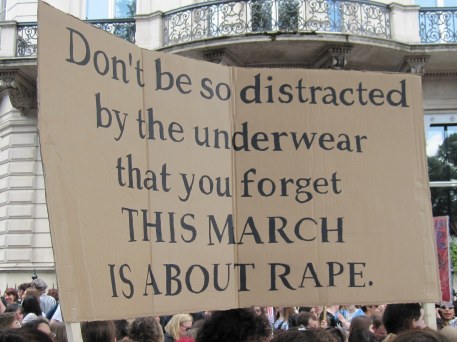International Day Against Victim-Blaming!
To celebrate the birthday of SlutWalk… It’s International Day Against Victim-Blaming!
From Toronto:
“On April 3rd, 2011 the first SlutWalk event took place in Toronto, Canada.
Inspired and influenced by powerful anti-violence efforts that came before us, SlutWalk aimed to fight against victim-blaming as a pervasive experience of sexual violence. It began in Toronto, Canada but quickly messages against victim-blaming spread to cities and communities around the world. We all want to see an end to victim-blaming. In the last year, we have seen amazing international collective action fighting against victim-blaming and fighting for respect and support of all survivors of sexual violence. In recognition of these efforts and many other ongoing actions, we mark April 3rd, 2012 as the first International Day Against Victim-Blaming.
We invite you to join an online day of action for the International Day Against Victim-Blaming. Start conversations, take a stand, and take up space on April 3rd to fight for our right to live free of violence and victim-blaming. Join us in our mission to spread the word that those who experience sexual violence are never the ones at fault.”
Here are some photos you can share on any social networking website! The wonderful folk at Toronto made them… share them far and wide! You can also join in on twitter by using the hashtags #EndVictimBlaming and #MyBodyIsNotAnInsult
We demand our bodies and all bodies be respected. Our worth as human beings is not determined by our sexuality.
No matter what I wear.
No matter what I look like.
No matter what my gender expression is.
No matter how much, how little, or what kind of sex I have.
No matter what I’ve done before.
No matter where I come from.
No matter how my body has been ‘devalued’ by others.
No matter what I’ve been called.
Because the victim of sexual violence is never at fault.
End Victim-Blaming! 
Slut Means Speak Up are making a film against victim blaming.
The Slutwalk London team are making a film to change attitudes about sexual assault, counter victim-blaming and provide legal and practical advice for rape survivors. The current ‘advice’ given to women by the police and teachers focuses on our behaviour: not to go out by ourselves, get drunk or wear ‘slutty’ clothes. We are looking for people who have experienced sexual assault to come on camera to talk about the blame they experienced, whether from the police, people close to them or from themselves - and how they have overcome and fought against it. Not only will this force people to change their views about who is to blame for rape, but it will inspire others who have been silenced and victimised.
If you are a survivor of sexual assault, or if you have challenged victim blaming in any way - for example, by speaking up against victim blaming by your friends, teachers or the police - we would like to hear from you and will try our best to include you in the film. Please don’t hesitate to contact us; everyone’s voices are welcome and we would like to include as many different experiences as possible.
Are you interested? The next step…
Please contact us at [email protected] to talk about participating. This will help us see how we can include you in the film. We can give you more information about the film, and arrange a time and date for filming.
More information…
You will not have to reveal your name, age or any other personal details. The interviews will take around 10 minutes; if you feel uncomfortable at any point we will stop filming and there is no pressure on you to say anything you don’t want to say. We will need you to write down a few basic points of what you’re going to say beforehand, and to travel to a location in London to be filmed (if this is very difficult for you we could help with travel costs or travel to where you live instead). If you are uncomfortable being on camera there are ways in which we can make you anonymous, such as filming you from behind or as a silhouette.
Are you from an organisation?
We are also planning to include legal and practical advice in the film. This will include basic pointers on what victims can do after an attack to feel safer, advice on going to the police and on taking a case to court. If you are from an organisation (including student organisations) which supports victims of sexual assault, whether you provide counselling, crisis help or legal advice, please contact us and we will do our best to include your experience and advice in the film.
We are making this film together with Women Against Rape, Black Women’s Rape Action Project and the English Collective of Prostitutes.
- Posted 2 months ago
- 9 notes
- Permalink
- victim blaming
- women against rape
- slutwalk london
- slut means speak up
A disabled sexual assault survivor speaks out: “I had fantastic support and still felt to blame”
[trigger warning: description of sexual assault]
It was a Sunday, at about 5pm in 2003, at Derby station, and I was waiting on a platform when I clocked a guy walk past me a few times. I remember thinking it was odd because it was like he was literally circling me, and he was quite close. Typically British I didn’t really think anything of it, and thought that when the train got in, I could get on and wouldn’t see him again.
As the train pulled in and I went to get on, he was behind me all of a sudden. I always went for 2 seats on their own, and did again, but when I got near, he followed me in, oddly saying ‘you first’ despite me being in front. I still thought that it would be an awkward journey rather than dangerous and just started to look out the window rather than talk to him. I can’t really remember how long it was before he spoke, or what order he said things. I think he started by showing me some new trainers and then telling me of a club in Nottingham which wouldn’t let him in because he had the trainers on and because he was drunk.
I remember feeling uncomfortable how much anger he was showing about something insignifcant. He then showed me 2 peoms he’d written, I can’t remember the first but the second one terriefied me from the start. It was basically about a woman he saw from a distance in a club, he decided he wanted this woman and nothing would stop him. When he got close to her, he saw she had a wedding ring on, but believed that she only wore it as a flirtation, to encourage him to try harder. He told me that he had written it as he felt some women did things like that.
I can’t remember whether it was the poem, or him, which went on to tell me that he would treat her as badly (sexually) as he wanted and she would have deserved it, even secretly wanted it. I remember starting to feel really uneasy, I hadn’t really said anything by this time, I’d been looking out the window most of the time. A conductor came round and I felt an enourmous sense of wanting to get his attention, coupled with an enourmous sense of fear of annoying this man. I’m almost ashamed to say that I showed my ticket and let the conductor pass.
The guy then put his face close to mine and tried to kiss me, I turned my face to the window and caught my reflection, which was crying. He put his hand on my knee, and I tried clenching my legs together, he moved his hand further up my knee and between my legs untill he was touching me, I’d been saying no, probably too quietly as stupidly I didn’t want to make a fuss, and he said ‘you haven’t got any arms, you can’t do anything about this’. I haven’t mentioned my disability before as it has never been an issue, but this made it one.
We must have pulled into Nottingham around about then, I asked to leave as it was my stop, he got up but then gathered his things saying he was getting off too. I saw a woman get up about my age (I’d have been 22) and I moved as quickly as I could to her, still not really wanting to draw attention and I got to be stood behind her just a fraction before he got behind me, but before I could say anything, he put his arm round me and thrust his groin into me. I guess (apart from my tears) we just looked like a couple. He kept his arm round me till we got to the concourse, before we got there I saw two police officers walking in the opposite direction but again was scared to do anything.
I didn’t want to leave the station with him anywhere near so said I needed to get some tickets for an ongoing journey, he told me he was going for a drink, told me where and even invited me for a drink before kissing me on the cheek and saying how nice it was to meet me. I watched him leave then jumped a taxi home. I don’t know why I didn’t go to find the police, or tell anyone on the station, I just wanted to get home.
I didn’t tell anyone for a few days, I didn’t leave home actually. In the end I told a friend who encouraged me to go to the police. I finally did, and got an incredibly supportive response from them. I gave information over the phone then two officers came to take a statement later that day. One of the officers asked me what I was wearing on the day and I remember feeling glad I had been wearing jeans, a jumper and a long coat. I voiced my worries to the officer about how glad I was I wasn’t wearing something that could have been interpreted as ‘asking for it’, and the police man (I’ll always be thankful of this) admitted that whilst clothing was important in the court room, whatever I had been wearing would not ever give someone the right to feel they could take what they want. This policeman coincidentally turned out to be the one I had seen at the train station whilst I was with the guy.
They took a really detailed statement, reasurred me that none of it was my fault and left, promising to keep in touch. Asd they left, they told me they suspected who it was, he had really identifable tattos on his face, and knew where he often was. I heard from them again a few weeks later, they had arrested the man they suspected and had gone to his flat with a warrant where they found the trainers he told me about, and also the poems. He was arrested and charged and they said I’d be advised of any court processes as he was pleading not guilty so I would have to give evidence.
I got a letter from Witness Care with proposed dates etc but then heard nothing for 2 years. In that time, I had moved house, graduated, changed jobs etc, and one day in 2005, I received a call from the policeman who took my statement. He said that the guy had fled the coutry to India, he tried to enter the UK again and was arrested for my indecent assault, I never really found out why noone told me he’d fled. In credit to the policeman though, he had tried calling me at my old address, and somehow tracked down my Mums address who gave him my number, again I’ll always be grateful that he took the effort to find me. The guy changed his plea to guilty and was later sentenced to 4 years imprisonment and put on the sex offenders register indefinately. I received confirmation of this in writing, I remember thinking it was odd that it was the first time I found out his name.
At this time, I was contacted by victim support, they came and took information from me to be used in licence conditions, everything seemed perfectly sensible untill the lady asked if I’d like an exclsuion zone to be given to him so he couldn’t enter specified areas. She thankfully discouraged me from taking this as she said he would then be told my full name and part of my address so he knew where to avoid!!
Looking back, I find the whole thing really tough, but not for the most obvious reasons. I only remember small details, I remember what I was wearing, and things he said, but can’t even remember what month it was, let alone the date. I remember the physical aspect didn’t disgust me as much as his use of my disability against me. I never told many people what he said, just what he did, because he is about the only person who has ever left me feeling vulnerable for my disability, and it isn’t something I care to admit. I don’t remember his name, its something I tried to do intentionally. I’m not really sure why, I think it made it more real to attribute it to a person. I alse remember the importance of small things, such as how I was treated by the police. And I remember asking my sister what would happen if I gave evidence and he was still found not guilty. She said that him being found not guilty didn’t make me guilty. That single point is something I struggled with, I never made peace with the fact that people wouldn’t believe I had in some way, instigated it.
I had fantastic, and full support from everyone involved and still felt to blame. I still feel angry that it happened, but I find it harder to think people (men and women) don’t always get treated as well as I did, and don’t get enough support. My experience was relatively minor, I can’t imagine how people cope when they feel they are not only taking on their attacker, but also the system. It’s tough enough as it is.
- Posted 3 months ago
- 22 notes
- Permalink
- disability
- rape
- sexual assault
- slut means speak up
- slutwalk
- victim blaming
- why i am marching
Our protest outside the Crown Prosecution Service - (trigger warning for discussion of sexual assault)
On 1st July Slut Means Speak Up, together with Women Against Rape, the English Collective of Prostitutes, WinVisible and the Black Women’s Rape Action Project, took to the streets to picket the Crown Prosecution Service. We demanded an end to the unjust and misogynistic treatment of those who report rape only to be derided, shamed and blamed by the police and courts, and demanded protection for the sex workers who the legal system prosecutes for working together for safety, preventing them from reporting sexual violence.
We came together to protest the 6.7% rape conviction rate, the attack on women by the legal system and the criminalisation of sex workers - but statistics and legal reports come nowhere near to explaining the anger and pain that rape victims and sex workers feel at the hands of a legal system which claims to protect us - but instead protects our attackers. Almost everyone at this rally felt empowered to take the microphone to speak about their own experiences - from a sex worker who had been harassed by police on the streets of Paris, to a man who asked the police to act on the sexual grooming of his thirteen year old daughter only to find himself facing an accusation of harassment against police staff, to a woman who held up a picture of her battered face taken after her rape, to a young woman who spoke of the harassment and ridicule young women reporting sexual assault face from the police. A speaker from Women Against Rape told of a case where a man had filmed the woman during his rape of her. At great risk to herself, the woman managed to obtain the video and take her attacker to court - where she was then shown the video in the courtroom. She broke down crying and the judge said that the case was ‘too traumatic’ and put it ‘on file’ - which means that there is no chance of re-opening the case to win justice for this woman in the future.
Niki Adams, from the English Collective of Prostitutes, spoke of the case of Sheila Farmer - a sex worker who reported a gang which had been roaming the area and attacking women, only to find herself on trial for working together with other sex workers for safety. The police charged her with brothel keeping, raided her flat and confiscated her possessions. We were also there to support two women, both mothers, imprisoned for making so-called ‘false allegations’: Gail Sherwood, who was found half naked in a remote field, her hands tied above her head, visibly suffering from shock - yet the police called her ‘a sad, lonely 50-year old who couldn’t get a man and had made it all up’ and lost key evidence. The other is Leyla Ibrahim, a woman who claimed she was attacked on January 4th, 2009. Her mother reports that ‘she scrubbed herself in the shower until she was practically bleeding. She forced her brother to sit in her room with her so she was not alone’ after her assault, and an expert medical witness claimed that it was ‘unlikely’ that her injuries were self inflicted - yet she is now in prison for making a ‘false allegation’ of rape. And a young woman spoke of her rape in her flat at the hands of a friend, which the police told her was her fault for letting the man into her flat. These are real people with real experiences and real anger. We cannot be covered up and silenced by government reports which admit the ‘regrettable’ state of rape prosecutions but take no action, or by the rape apologists who claim that women were either lying or “asking for it”. Our voices are loud and our demands clear.
For a long time rape has been something which our police, law officials and government have been happy to force behind closed doors. Either evidence is lost or badly handled, or her clothes, sexual history, age or skin colour mean that it was not rape and she was in fact “asking for it”, or “men can’t get raped” or it is not “proper” rape - too ‘complicated’ for the attacker to be held to account, as Ken Clarke says - or the woman must be lying. But on the 1st of July we were angry and determined to be heard as our words echoed loudly through the street - giving the Crown Prosecution Service no choice but to listen. Rape - the private pain of the individual - is being transformed into the public protest of the survivor as people of all genders, races and backgrounds come together to insist that we are protected and treated fairly by the law which claims to be accountable to us - yet refuses to protect society’s most vulnerable people.
The success of this demonstration mean that it is likely we will hold another one in the near future so watch this space! Thank you so much to everyone who came and made it such a powerful protest and such a powerful celebration of our refusal to be victimised and intimidated by those who claim to protect us - we hope to see you again and to anyone who couldn’t make it, we hope that soon you will join your voice to ours.
Photo: Niki Adams
More photos of the event can be found here and here.
Anastasia
- Posted 9 months ago
- 21 notes
- Permalink
- slutwalk london
- slut means speak up
- rape
- crown prosecution service
- rape culture
- victim blaming
Donate to SlutWalk London 2012! We still need over £2,000 for a PA system, permits, stage etc.
A film against rape We are making a self-help film about rape which educates us instead of telling us to be ashamed.
SlutWalk London 2012!
Sheila Farmer's prosecution dropped
Photos: Tom Radenz and Claire Butler









